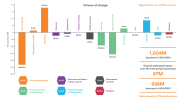TheGrandWazoo
Veteran Member
@RT4038 is right in saying that for large tracts of the country, the bus is already something that is not a viable option in provincial towns and villages, and in fact, it never has been. Car ownership has been disproportionately cheaper whilst bus operations have had more and more legislative burdens (and related costs) placed onto them.When people talk about improving bus services, they tend to ignore the extra emissions, both tail-pipe emissions from diesel, and Non-Exhaust Emissions such as tyre particulates.
"Better" services almost always means new routes or more frequent services, so many more bus-km. And while there may be some voluntary modal shift, where are the case studies showing that the extra emissions from the buses will be less than the emissions from car journeys saved? Even if a better frequency did bring a big increase in passenger numbers, experience elsewhere suggests that most "new" usage is either abstraction from other routes, or modal shift from walking or bike, or new journeys that people wouldn't otherwise have made (which might be good for society, but it doesn't offer any reduced emissions to balance the extra emissions from the additional bus-km). It is only those shifting from their car who count if you are looking at emissions.
Making anything like the necessary reductions in emissions from ground transportation is going to need the large majority of people-km travelled on trains or well-loaded electric buses.
Outside the densest urban centres, achieving high loadings across the whole of the miles travelled by buses is a big challenge. You are stuck with tidal flows, which at their most extreme mean that a bus can't carry more than 50% of its crush capacity across the whole round trip. You will have to be readier to run part-route journeys (because the outer parts of a route can't achieve the necessary loadings if you simply run every trip end to end). And you are going to have to space out off-peak runs way thinner than the turn-up-and-go service that would be the starting point for achieving voluntary modal shift.
I am yet to hear anybody with the faintest idea of how voluntary modal shift can be achieved whilst achieving a useful reduction in emissions. The recent Arup report of a conference looking at the issues in Wales is long on challenges and concerns, and depressingly short on viable steps that have any hope of getting more than a tiny number of current car users to leave their vehicle on the drive and head for the bus stop (let alone contemplate ditching their car altogether).
The comments about emissions are all very laudable, but even this week, Andy Burnham has stated that there is not going to be any Clean Air Zone in Greater Manchester, so all the stuff on per capita emissions is frankly ignored, as it was in Bath and Sheffield to come up with two examples. Instead, AB states that investment in public transport will simply do the trick without any clear idea as to how that will happen. Apparently, bus reliability and punctuality has improved but, in the absence of any physical measures to improve this, it can only have been achieved by having additional resource.
Of course, some posters will say "London, Paris, Munich" and state how they have much better public transport they have there because it is publicly controlled. They forget to mention the substantial amount of funding that goes into achieving that, and it's that which really makes the difference. Instead we have the hunger games situation though as we've seen with BSIP, throwing £5m p.a. to a shire county will frankly disappear without trace. Politicians are perpetuating the lie that by moving to franchising, you can have a world class public transport system and that it will be self-funding, and that you won't need to inconvenience any drivers either. No, those drivers will simply realise that they need not have a car and dispense with it...(sarcasm applied)
For buses, there has to be a means of improving the time and convenience elements. And no, let's not start saying that every passenger gets on and has a ten minute chat with the driver; by moving to a FartenkirkenKart or whatever scheme from a Western European city, things will miraculously improve. Very few passengers these days pay with cash and have an interaction - many are twirly pass holders whilst many others just scan a pass and get on. The issue in many towns and cities is about congestion and road space utilisation but politicians won't dare broach that.
If you look at the West Midlands Enhanced Partnership submission, you'll see the main factors that impact bus travel. Simply buying a car is a massive issue (if you have one, you use it). Bus fares are a factor as has been the increase in online work and shopping but time is another huge issue. You're simply not going to forego your car if you have one typically but if buses are quicker, can be more reliable in terms of robust timetabling, and it's not as easy to park your car, then you might influence some modal shift. That's what we've seen in Brighton, Reading, Oxford and on the Sprint corridor in Birmingham. Simply painting them yellow and paying for an extra bus and driver(s) won't achieve that.
Ted Talk over!

